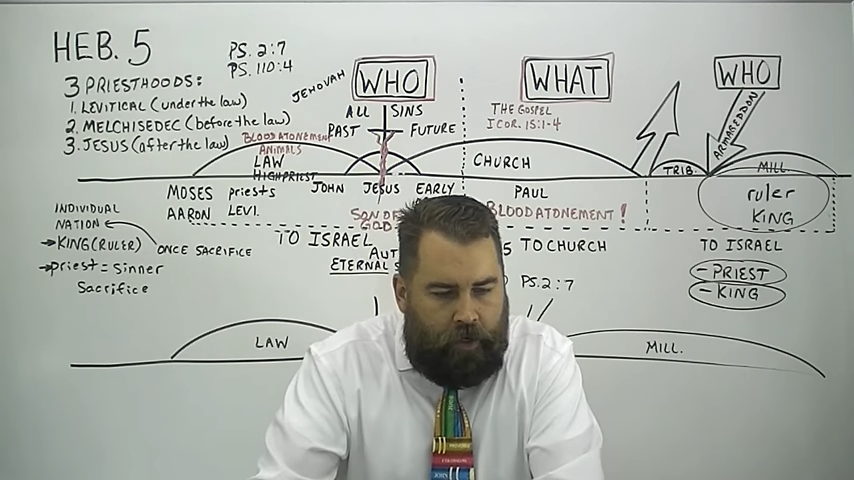Insights
Jesus as the High Priest and Sacrifice
🙏 Jesus didn’t choose to become a priest, but was called by God to be the high priest and sacrifice for the sins of the world.
🌟 Jesus Christ is considered the son of God, born of a virgin and sinless, coming as a sinless substitute for humanity.
💥 Jesus Christ is described as a high priest forever after the order of Melchisedec.
💪 Jesus Christ learned obedience and humbled himself, even unto death on the cross, which ultimately led to his exaltation by God.
💉 Jesus became the blood atonement, the blood sacrifice for the sins of the whole world.
💪 Jesus suffered for us, bearing our sins in his own body, so that we may live unto righteousness.
💉 Jesus Christ’s suffering and shedding of his blood served as a blood atonement for our sins, leading to eternal salvation.
The Importance of Faith and Salvation
💡 According to Paul, through Jesus, forgiveness of sins and justification are available to all who believe, surpassing the limitations of the law of Moses.
💡 Paul emphasizes the importance of knowing what Jesus did for salvation, highlighting the significance of understanding the crucifixion.
🙏 Understanding both the identity of Jesus as God manifest in the flesh and the sacrifice he made for humanity is essential for grasping the message of salvation.
💡 The concept of God sacrificing Himself for humanity’s sins before even creating humans highlights the depth of His love and forgiveness.
📖 The book of Hebrews emphasizes the importance of faith, stating that “without faith, it is impossible to please [God].”
Old Testament Scripture and Paul’s Teachings
📖 The birth of Christ fulfilled the prophecy of Daniel, confirming Jesus as the Messiah.
🤔 The author of the book of Hebrews, possibly Paul, frequently quotes Old Testament scripture to support his teachings, distinguishing him from other apostles.
🤔 The Apostle Paul strategically references specific verses in the Old Testament to encourage readers to explore the context and gain a deeper understanding of the message.
Summary
TLDR: The key idea of the video is that Jesus Christ is the Son of God and the promised Messiah who came to earth as a sinless substitute to die for our sins and offer forgiveness, and that salvation is achieved through faith in him.
- 📜 Jesus, referred to as The Anointed One and the Messiah, was declared by God the Father to be the high priest and sacrifice for the sins of the world, unlike other high priests who had to sacrifice for themselves before accepting the sacrifice of others.
1.1 The speaker continues discussing Christ, who is referred to as The Anointed One and the Messiah.
1.2 High priests are ordained to offer gifts and sacrifices for sins, and they must first sacrifice for themselves before accepting the sacrifice of others.
1.3 Jesus did not appoint himself as a high priest, but rather God the Father declared him to be the high priest and instructed him to become the sacrifice for the sins of the world.
- 📖 Paul quotes Psalm 2:7 to emphasize that Jesus is the Son of God and the promised Messiah, suggesting he may have authored the book of Hebrews, and he preaches to the Jews about salvation through Jesus, not the law of Moses.
2.1 Paul repeatedly quotes Psalm 2:7 because he knew that the Jews believed it was about the Messiah, and he uses this verse to emphasize that Jesus is the Son of God and the Messiah.
2.2 The author of Hebrews quotes Psalms chapter 2 verse 7 multiple times to emphasize that Jesus is the son of God and the promised Messiah, and this, along with his frequent use of Old Testament scripture, suggests that Paul may have been the author of the book.
2.3 Apostle Paul is ordained by the church and sent out as a missionary to preach to the Jews about salvation.
2.4 Paul, the author of the book of Hebrews, quotes Psalm 2:7 to preach about Jesus and his role in forgiving sins and justifying believers.
2.5 Paul preaches to the Jews in Acts chapter 13, telling them that Jesus is their Messiah and the son of God, and that forgiveness of sins can only be obtained through what Jesus did on the cross, not through the law of Moses.
2.6 The speaker strongly believes that the Apostle Paul is the author of the book of Hebrews and hopes that through a verse by verse Bible study, those who doubt this will come to the same understanding.
- 🙏 Jesus Christ, the son of God, came to earth as a sinless substitute to die for our sins and offer forgiveness, highlighting the importance of believing in his divinity and role as the blood atonement.
3.1 Christ did not glorify himself to be made a high priest, but rather God the Father said to him, “You are my son, this day have I begotten you,” highlighting the relationship between God the Father and Jesus Christ in the Trinity.
3.2 God the Father can call his son Lord through the writings of Psalms, indicating that God came in the form of a man born from the lineage of David.
3.3 Jesus Christ is God manifest in the flesh, and it is crucial for Jews to believe this in order to understand and believe in his role as the blood atonement for their sins.
3.4 God created humans with free will, knowing that some would sin against him, but he still wanted their love, so he decided to die for their sins and forgive them.
3.5 Jesus Christ, the son of God, was born of a virgin and came as a sinless substitute.
- 📖 Jesus Christ, the Messiah, is the eternal priest after the order of Melchizedek, prophesied in Psalms 110, and will rule over his enemies in the Millennial Kingdom, despite being rejected by the Israelis as their Messiah and king.
4.1 The speaker discusses how the Apostle Paul quotes multiple scriptures, including Psalms 2:7 and Psalms 110:4, in order to emphasize the eternal priesthood of Melchizedek.
4.2 Jesus Christ is the Messiah and the context is explained through Psalms 110, which prophesies about Jesus being the eternal priest after the order of Melchisedec, with the Lord God the Father instructing Jesus to sit at His right hand until His enemies are made His footstool.
4.3 Jesus Christ will rule over his enemies in the Millennial Kingdom and defeat them at the Battle of Armageddon, but the Israelis rejected him as their Messiah and king.
4.4 Jesus Christ is a high priest who will strike down kings and fill the places with dead bodies when he pours out his wrath upon the earth during the tribulation.
- 📜 Jesus is the high priest and ruler over the people, threatening the Pharisees’ job as priests, while Paul tries to convince the Jews that accepting Jesus as the Messiah would lead to his rule as both King and priest, but because they didn’t, the church age began instead.
5.1 Jesus is the high priest and ruler over the people, combining the roles of the priest and the king in Israel.
5.2 The Pharisees wanted to kill Jesus because he threatened their job as priests, as he claimed to be able to offer forgiveness of sins without their involvement.
5.3 Jesus is the king and priest who offers forgiveness, while the priests are unimportant and Jesus is the one who gave them their job.
5.4 Paul is writing to the Jews, trying to convince them that Jesus is the Messiah and if they accept him, he can come back and rule over them as both King and priest.
5.5 The alternate timeline or reality could have occurred if the Jews had accepted their Messiah, leading to the church age, tribulation, rapture, Armageddon, and the start of the Millennial Kingdom, but because they did not, the church age began instead.
5.6 Jesus is a high priest after the order of Melchizedek, who offered prayers and supplications with strong crying and tears and was able to save him from death.
- 💔 Jesus prayed fervently to avoid his impending death, but ultimately submitted to God’s will, while Judas, despite kissing the blood of Jesus, was lost and went to hell.
6.1 Jesus prayed with strong emotion and asked God to let him avoid his impending death, but ultimately submitted to God’s will.
6.2 Jesus went to the Mount of Olives to pray, specifically in Gethsemane, and asked his disciples to pray with him to avoid temptation.
6.3 Jesus Christ was in such agony and despair that he was sweating drops of blood, and Judas, a lost man, kissed the blood that could have saved him.
6.4 Judas, despite having the blood of Jesus on his lips, was lost and went to hell, highlighting the fear and tears Jesus experienced, even sweating drops of blood, as he prayed to be saved from death.
- 📖 Jesus Christ, as the Son of God, became obedient through suffering, ultimately becoming the author of eternal salvation, serving as an example for us to follow and bringing us closer to God.
7.1 Jesus Christ, as the Son of God, became obedient to God the Father and learned obedience through suffering, ultimately becoming the author of eternal salvation for those who obey him, as stated in Hebrews 5:5-14 and further explained in Philippians 2:5-11.
7.2 Jesus, who was both fully God and fully man, took on the form of a servant and became obedient unto death, ultimately being exalted by God.
7.3 Jesus became the blood atonement and sacrificed himself for the sins of the world, suffering and learning obedience in the process, ultimately becoming the sinless high priest.
7.4 Jesus, as our sinless priest, suffered for us and bore our sins in his own body, serving as an example for us to follow and bringing us closer to God.
7.5 Jesus Christ suffered and died as our blood atonement for our sins, learning obedience through his suffering, and becoming the author of eternal salvation.
7.6 Jesus is the author of eternal salvation, but later in the book of Hebrews it is suggested that salvation can be lost if one enters the Tribulation Period and rejects Jesus.
- 📚 Salvation is achieved through faith in Jesus and his teachings, with the book of Hebrews urging Jews to recognize Jesus as the Messiah and mature in their understanding of the Word of God.
8.1 Salvation is not obtained through works, but through faith in obeying the gospel of Jesus Christ.
8.2 The speaker emphasizes the importance of faith in the book of Hebrews and Romans, stating that salvation and obedience to Jesus are achieved through faith in his teachings and the gospel.
8.3 The speaker discusses how both the Apostle Paul and Jesus mentioned that the Jews were dull of hearing, emphasizing that Paul wrote the book of Hebrews and Jesus specifically ministered to the Jews.
8.4 Paul called together the chief of the Jews in Rome to explain that he was imprisoned for the hope of Israel and to persuade them about Jesus, but some believed and some did not.
8.5 Paul is writing the book of Hebrews to Jews, trying to reason with them and get them to see that Jesus was the Messiah and to trust in what Jesus did for their salvation, but they are dull of hearing and blind to the truth.
8.6 Paul is urging the recipients of his letter to mature in their understanding of the Word of God, distinguishing between milk (basic teachings) and meat (deeper doctrines), and emphasizing the importance of discerning between good and evil.


